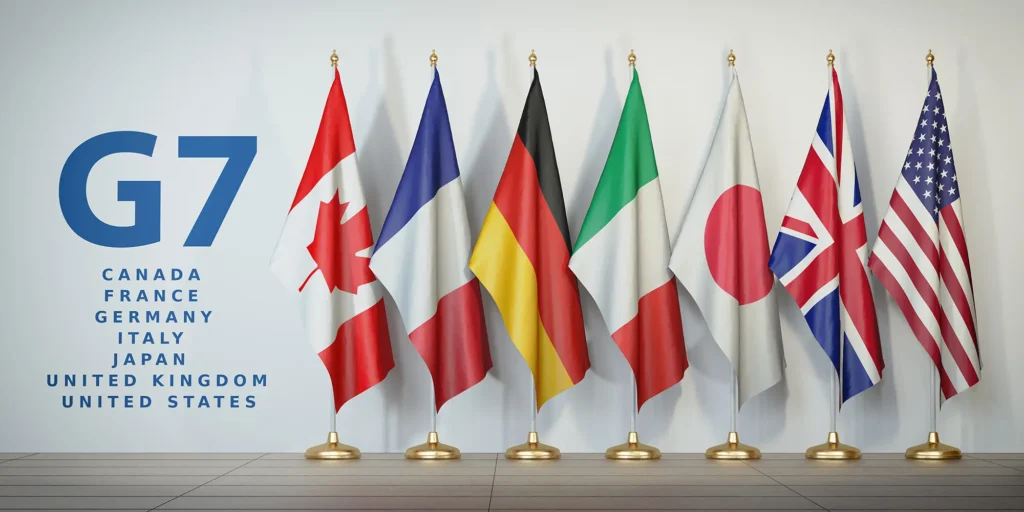Climate Diplomacy in an Age of Crisis
Reflections from Kananaskis: How Carney Cleared the Smoke Without Facing the Fire
Last week, Nell Sykes (one of our Clean50 Analysts this year) travelled to Banff with the G7 Research Group, a University of Toronto–based network of students, scholars, and policy experts that has monitored G7 summits since 1987. Each year, the group publishes a Compliance Report tracking how well members follow through on their commitments, and attends the summit to engage with media and stakeholders in real time. As Compliance Director for Forest Protection and Global Food Security, Nell helped lead this year’s research. In this piece, she reflects on what she witnessed on the ground, how reactive diplomacy under Mark Carney’s leadership pushed climate off the agenda, and what that absence reveals about global leadership in a time of crisis.

A Climate No-Show at the G7
Can you guess how many times the G7 used the words “climate change” in the official Kananaskis documentation? What about the words “fossil fuels” or “carbon”? The answer is…. none. Not even once did the words climate and change appear together.
As someone who monitors the news and keeps tabs on geopolitics, you may have anticipated climate might fade into the background to some extent. You may have even thought it was inevitable, given Trump’s presence and the ongoing war in the Middle East. He did pull out of the Paris Agreement, after all.
But before we blame this all on Trump or the pressures of geopolitical conflict, I want to shed light on another factor at play: Carney’s diplomatic approach.

After all, this isn’t the first time Trump has come to a summit, or left one early, for that matter, and it certainly isn’t the first time the world has been at war. It is, however, the first time since we started tracking in 1987 (excluding 2020 where all commitments related to the pandemic) that climate-related language accounted for fewer than 50 words in the final communiqué. This time, it was less than five.
Breaking the Action Record
At last year’s Apulia Summit, the final document included a record 19,795 climate keywords. Not only did the leaders make climate commitments at Apulia, but they also followed through on them. As the G7 Research Group’s 2024 Compliance Report demonstrates, the leaders followed through on 92% of the priority commitments they made in Apulia.

So, what’s the main difference this year?
Whereas a typical G7 summit ends with an extensive communiqué (last year’s was 36 pages), the Kananaskis summit produced a much slimmer collection of documents, totalling just a dozen pages. Carney streamlined his diplomatic approach, focusing on nine specific issues, none of which included climate.
In his attempt to create a focus group on the most politically contentious issues, Carney didn’t even try to find consensus on many of the G7’s most pressing concerns.
Shaping the Conversation, Or Avoiding It Altogether?
Before we left for the summit, part of what the G7 Research Group field team does is craft a predicted communiqué of commitments, highlighting the key priority areas for each member and topic. In advance of the Summit, we chose our language carefully aiming to reflect areas where we believed consensus might be possible.
For the climate topic, which fell within my area of responsibility, I deliberately tempered my language when assessing the expected outcomes to reflect zones of potential agreement. Instead of emphasizing the language of the Paris Agreement, as leaders have done in the past, I framed my commitment forecast around the issue of CCUS and decarbonization—while being sensitive to national priorities and energy security, as well as adaptation and healthy air and water. While far less ambitious than what I would personally hope for, this framing could have at least kept climate in the dialogue.

Although it’s impossible to know what Trump might have been willing to sign, he couldn’t have signed something that was never even drafted. Carney prioritized avoiding disagreement and disunity over attempting to show that G7 has any shared commitment to addressing climate change. There are always trade-offs in these decisions, but it’s not reassuring that climate gets left out whenever Carney faces trade-offs so far. Carney failed us, not because he lost a hard-fought battle with Trump over climate, but because he never even tried to broach the conversation.
What Leadership Demands — Now More Than Ever
G7 agreements may not always reflect the depth or ambition that some members, and their citizens, hope for when it comes to climate, but it is the Chair’s responsibility to ensure that the most important issues remain on the table and open for discussion.
At a time when so many crises dominate the geopolitical landscape, the G7 must remain steadfast in its commitment to addressing all the defining challenges of our era. We need our leaders to reassure us that they can handle the complexities of the present without forgetting their past commitments, or our future needs. Carney brought reactive diplomacy to the summit. What we needed was a proactive strategy.

Personal Reflections
This isn’t just about politics or detached analysis for me. As a student, as a citizen, as a human being, I feel betrayed by the leadership I want—and need—so desperately to believe in. I try to be a pragmatic person. I understand the nuances of diplomatic dialogue—of political compromise, but this experience filled me with a deep sadness that was difficult to shake. As I sat in the G7 Media Centre, surrounded by flashy screens and journalists, searching through the newly minted documents for words I hoped so earnestly to find, the weight of what was there really hit me. I took a break from it all and walked outside into the magnificent landscape of Banff, grounding myself in the one thing I know for sure: we can not give up on protecting our earth. Sometimes it feels unfair, like my hand is being forced to direct my life towards this cause. I sometimes wonder how my career goals would take shape if I didn’t feel the need to devote myself towards averting the climate crisis. I’m sure I’m not alone in that.
This is why we need our Clean50 network more than ever. We need people we can rely on—people who never give up on sustainability or let it fade from our vocabulary, even in the face of other crises. Let’s keep fighting for the future we deserve, together. And if you’re feeling down, remember: we always have each other to lean on as we continue to fight against the current for change.














